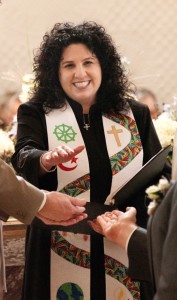 For many years, the term “interfaith” was used as an adjective to refer to a coming together of people who espouse different faith traditions in order to complete a particular task (e.g. “interfaith dialogue” or an “interfaith worship service”). However, in recent years, a second meaning has arisen. “Interfaith” when used as a noun refers to a spiritual path that integrates teachings, practices, and beliefs from several traditional and nontraditional religions, denominations, and ethical systems.
For many years, the term “interfaith” was used as an adjective to refer to a coming together of people who espouse different faith traditions in order to complete a particular task (e.g. “interfaith dialogue” or an “interfaith worship service”). However, in recent years, a second meaning has arisen. “Interfaith” when used as a noun refers to a spiritual path that integrates teachings, practices, and beliefs from several traditional and nontraditional religions, denominations, and ethical systems.
Millions of people today, especially our younger generations, routinely cross boundaries that previously divided religions from one another, and some of them have found a spiritual home not within a particular tradition but in the open and undefined space between them. Unconstrained by a specific religious tradition, yet striving for a personal sense of morality and spirituality, they engage in a freeform mixing and blending of wisdom, beliefs, and practices from many sources. This is Universal Interfaith!
Interfaith clergy promote an inclusive theology and are dedicated to serving the spiritual needs of all who seek their guidance regardless of religious beliefs, race, ethnicity, family structure, sexual orientation, gender identity and expression, mental and physical health and abilities, education, or socio-economic status.
